|
This is an Easter Talk given by
Phoebe Mabel McLachlan-Crowe, in 1958, at a Women's Christian Meeting
(The Salvation Army - Home League) held @ Narwee, a suburb of Sydney NSW
AUSTRALIA
Trees
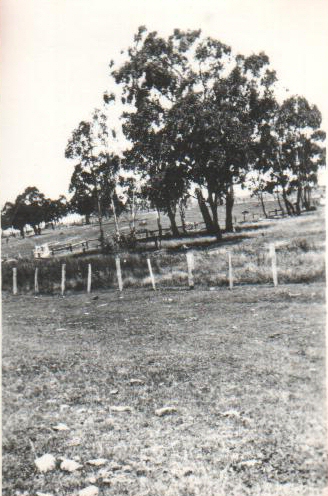
Tree at Metz nr Hillgrove NSW
When I said to myself so glibly
"I'll do a meeting on 'Trees'. I love trees," I didn't realise what a
great subject I had chosen, & just how much I could say, & just how much
I would have to leave out. Yes I love trees; & I should think most of you
love them too.
There are trees growing right
through our Land of Memories, reminding us of happenings & events, trivial
perhaps, or not so trivial. Really the first tree I remember grew in the
back yard of "the house where I was born". All my mother's children were
born in their own home; & were none the worse for that.
This tree was a big blue gum tree.
It had a swing hanging from a great branch, & there were well worn patches
between the roots which protruded above the soil. These patches were swept
regularly & vigorously, for they were the "yards" belonging to the cubby
houses; that were built among the branches overhead.
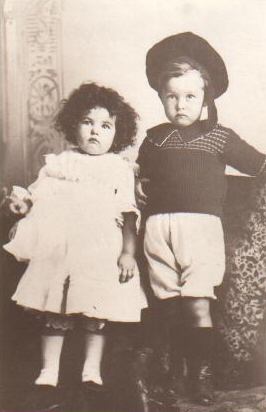
Chn sent old gum tree - Phoebe & Angus in 1901
I remember this gum tree
particularly well because when we were naughty or just in the way of busy
people, we were sent out under the tree; & it was used then as the Jews
use their "Wailing Wall". We buried our heads against its rough bark &
wept & meditated on the unfairness of all grown-ups till we felt good
again.
It was under this old gum tree, a
brother a little older than myself, & I were hustled one day by a big
sister, & told to be "good & quiet". We were still in a bewildered state
when down the long white path with her little brown bag, came the lady who
brought the babies (& who had brought us, ourselves).
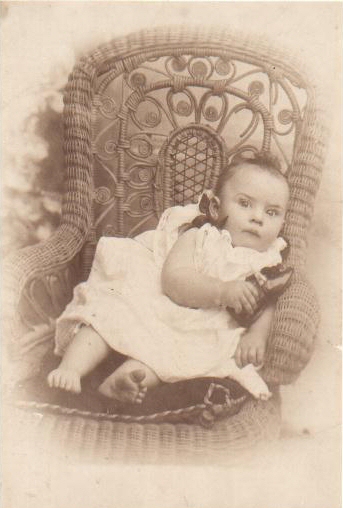
New baby at Metz
She greeted us & we shyly greeted
her; but we kept well out of the way of the mysterious lady who brought
little brothers & sisters in a little brown bag. Sure enough, it wasn't
long before we were called in to see a lovely rosy little new sister; & my
baby days were done.
Years after when I was first
married (1933), - like newly weds of today (1958), my husband & I were
in search of a flat. A furnished flat I wanted, because I didn't want to
buy furniture until we had our very own home. We wanted it near The
Salvation Army Hall; & we were "soldiering" @ Paddington (a suburb of
Sydney) at the time.
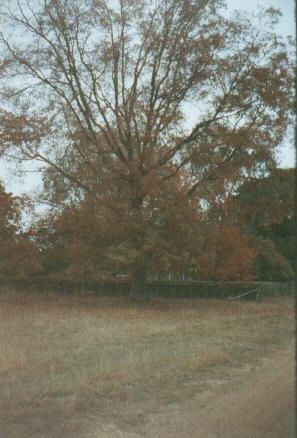
forest trees - fla
We walked & walked till at last
near "Fiveways" (centre of Paddington) of all places, my husband was
attracted by a small forest of trees; & nothing would hold him. He had to
go in to see if they had "rooms to let".
They had; & only just vacated -
not even swept out or in any way prepared for new tenants. When we looked
out the window, down on to a lawn, surrounded by lovely trees, jacarandas,
magnolias, flame trees, coral trees, maple trees, - a merry mix of all
kinds of trees; & in the middle of the lawn, a round bed of dainty
delightful pink & blue delphiniums, we were enthralled.
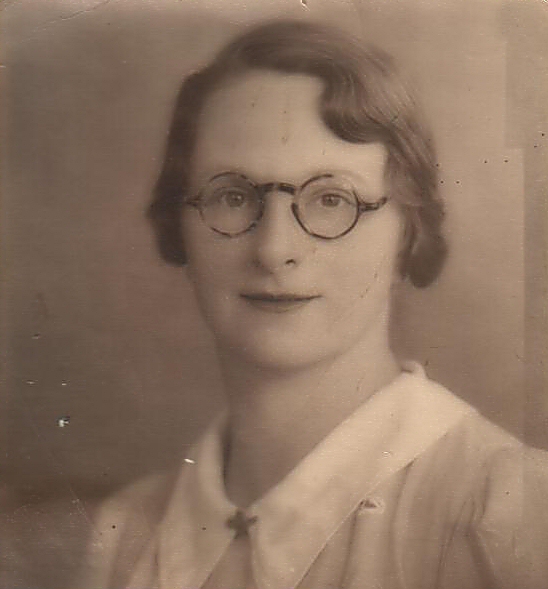
Betty nee Johnson Jones - friend of newly weds
- visitor at flat
But the flat was unfurnished & not
exactly what I wanted; & being a new wife whose opinion mattered, I said,
"Thank you --- no"; & my husband meekly followed me out. But he was not
meek for long; & he was soon back to engage the flat. The Landlady was
not surprised; she said, "I knew the TREES would do it."
Our friends who called on us were
constantly amazed at the beauty of those trees; & the wonder of finding
them in the busy dusty heart of Paddington. I might as well tell you it
was right next door to the Scottish Hospital, whose grounds also had a
number of lovely trees.
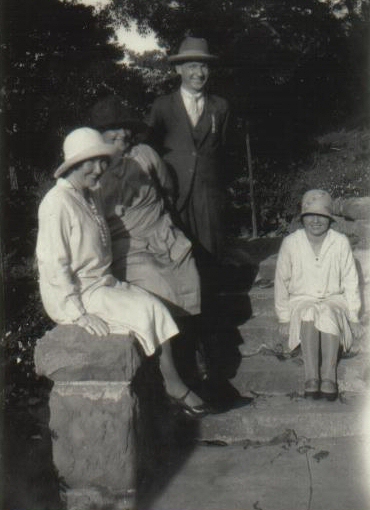
Veronica - friend of Phoebe - Alice nee
McLachlan her husband Fred Rixon -& Phoebe nee McLachlan
Then there was the Moreton Bay fig
tree we grew in the yard of a place we rented in Bexley (suburb of
Sydney). It grew & grew. It made a lovely shade. The children had a
hammock slung in its branches. Nearby there was a large Wattle Tree in
which my small daughter used to climb in order to see things that were
further away. Some time after, we left that place. One day, my husband
came home in great distress & said, "They've cut down OUR fig tree." I
supposed that they had to cut it down. It had probably taken over the
whole yard.
These are but a few Trees of
Memory. Now we'll pass on to Trees of Use.
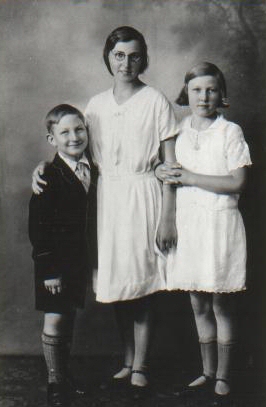
three youngest chn of Lilly nee McLachlan were
George & Dorothy & Marie - regular visitors to newly weds flat
We often hear the phrase, "A dog
(or a horse) is a man's best friend." I think that the same could be said
for a tree. The tree is said to be much akin to man in many ways. It has
to breathe; & the air is taken into its leaves just as truly as we take it
into our lungs. It also has as great a circulation as ours, though slower
but exactly on the same principle. It has a digestive process. It makes
provision for its young to carry on the race. Like man the tree has to
battle for a living. If food is scarce, their roots travel along under
the surface in search of it. If water is scarce they send roots down after
it. If crowded they stretch upwards towards the sun. If the situation is
windy, the roots take a firmer grip. A fascinating subject we could go on
& on. They nourish & make fertile the soil. Yet an Anglo-Saxon man's idea
of progress is to go forth & cut down trees.
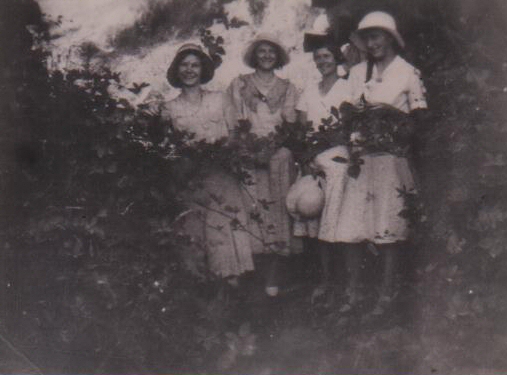
daughters of Alice Jean nee McLachlan
We all have an idea even if it is
a vague one, of the value of the rubber-bearing trees. The story of how
the rubber plantations were started is really fantastic.
Originally these trees were found
only in Brazil; & although the Brazilians had no idea at the time how many
uses rubber could be put to; or how it could be improved upon, they were
very jealous of it; & refused to let any plants or seeds out of the
country.
A Mr Wickham had collected
thousands of seeds from the best rubber-producing trees & was trying to
smuggle them out of the country; but it was a long time until an
opportunity was created. At length he got them to England, where they were
planted in the orchid houses in Kew Gardens.
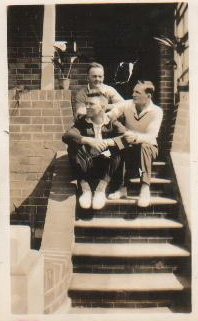
Dan McLachlan & Rixon nephews - visitors of
newly weds
Within a fortnight the gardeners
were thrilled to see a forest of over seven thousand little plants. Soon
some of these were being sent to Ceylon (Sri Lanka), India, Singapore, to
become the forbears of the thousands & thousands of valuable
rubber-bearing trees. The uses of rubber are almost limitless.
The coco-nut tree is said to be of
unlimited use also, more diverse than the rubber tree. The Good Lord must
have been proud of that tree when He first made it. He took every
precaution to make sure that it would survive.
It is said that a man could
clothe, feed & shelter himself from the coco-nut tree. Mats, ropes,
brushes, sails, paper, quilts, are a few of the things made from this
fibre. Huts, handles, oars are a few that can be made from the wood;
drinking vessels from the shell. Margarine, soap, candles are some that
are able to be made from the oil --just a few uses of the coco-nut tree.
Inside the kernel is one big white seed; & the nut that we eat is the food
stored up for its use. The milk is the moisture reserved for its
nourishment.
What we called "the monkey's
beard" when I was little, is a protective fibre which acts as a spring;
& causes the nut to bounce instead of cracking when it falls from its
great height. Outside the fibre is a green casing, which we never see,
an added protection. The three small holes we used to think were features
of the monkey's face, one of these holes is an outlet for the root of the
new coco-nut tree.
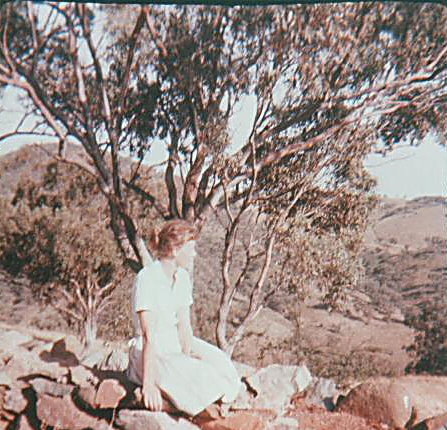
Aus love gum trees - Alison nee Rixon-Page -
photo neath gum tree
Truly God took great pride in his
work when He planned the coco-nut tree. The God who cares for the
sparrows evidently cares for the trees too.
The date tree is almost as helpful
as the coco-nut tree. It is called the Arabs' friend. Its fruit is very
nutritious, date-honey can be squeezed from the fruit, palm wine can be
made from the sap, the buds form palm-cabbage, the stones are ground to
make a substitute for coffee; & they also yield oil. The leaves are made
into baskets & mats, the fibre is wound into string; & the wood is used
for building huts.
The Palm tree is most helpful to
the people of its territory. We are told that the Palm tree, the great
friend of the Arabic People, stands with its feet in salt water & its head
in the sun. Often the people cannot drink the water found in the oasis,
it is so brackish. Then they tap the tree & drink the sweet palm wine
that runs out of the tree. The tree by the "magic" of its inner life
changes the elements in the unkindly soil around it; & it helps it with
its growth & strength & fruit bearing.
We cannot help but have renewed
confidence in our Creator when we think on these miracles; & the wonderful
provision that He has made for His people.
Three of the most Useful Trees in
the world - now let us move to Trees of Beauty.
If we started a discussion on
Trees of Beauty we would get some very different opinions, for there are
so many trees of great & almost unbelievable beauty. After all, our
judgement would be influenced by association or memory, or just by
prejudice.
I heard one English lady say that
Australians liked the gum trees because they didn't know any better. Of
course, that was foolish to say the least, for we Australians have many
native trees other than the gum trees that are really beautiful & unusual.
We are told that the chestnut tree
in England is one of the most beautiful of all trees, but even so it is
really a native of Greece, India, Persia (Iran). It has made itself at
home in England for centuries; so we will allow the English to claim it
as their own, - the horse chestnut tree, one of the most beautiful of
trees.
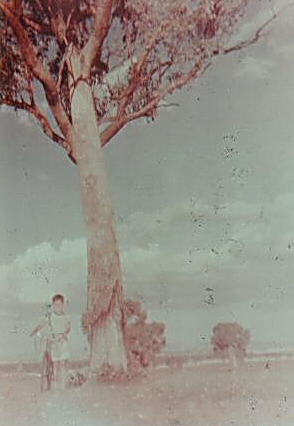
Aus love gum trees - Rodney Rixon - property
Glenroy Duri NSW - photo near gum tree
There is a legend that the dogwood
tree was one of the biggest & strongest of timber trees. It was used in
far off days in Palestine (Israel) when needed for some special tool or
article of furniture.
There came a time when a very
special cross had to be made for a very special victim. The carpenter
engaged for the work, looked around for a sufficiently hard & strong
wood. The dogwood tree was very proud when it found out that its wood was
considered the most suitable of all. But after seeing the sufferings of
our Lord, it was ashamed & heart-broken. Our Lord forgave the tree but it
did not grow big & strong ever again. Its little white flowers came in
the form of a cross with the tints of the rusty nails staining its points.
"The Dogwood Legend
A legend says the dogwood tree
A giant of the forest stood.
'Twas used to make the Cross of Christ
So strong & sturdy was its wood.
When this distressed the tree, Christ ruled
Its evil use be changed to good.
A slender tree now, filled with flowers
Four petals like a cross. They bear
His rusty nail prints stained with blood
His crown of thorns imprinted there.
Above all else their beauty shows
The Risen Life exceeding fair.
In gardens & by winding roads
And lonely shacks, the dogwood tree
Abounds with flowers pink & white.
God plants the trees for all to see
And know the joy of Easter-tide
And His great love for you & me."
I read a story of a Christian
sailor on a trading ship which called at the Bay of Desolation off the
coast of Africa. The heat was terrific, dust & sand was blowing off the
land. People clothed in rags were wrangling & arguing as they came aboard.
The rattle & whine of machinery & the oaths of the men who were working
the machinery, made the second mate cry out in disgust, "Sin, sand, wind,
coal & blasphemy; & it's Good Friday."
The Christian sailor paced the
deck & thought to himself "Good Friday & nobody cares." Just then he
heard a scuffling on the darkening deck & called out, "Who's there?" In
the shadows a ragged lad appeared before him & said uncertainly, "They
tell me you are a "Jesus" man. Long ago I heard them tell about Jesus.
The pantry boy tells me you are a "Jesus" man. When His dying time comes
round I like to think of Him."
The Christian sailor told the
questioning lad about Good Friday; & what it meant to him. With more
understanding of Jesus & His dying time, the lad went back to his chores.
The Christian sailor was thankful that he had been able to share the
Easter story with some one who wished to think of Jesus.
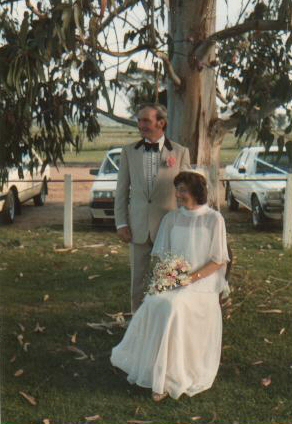
Aus love gum trees - Bill McLachlan-Simmons &
bride at Bingara NSW - photo - neath gum tree
In conclusion, let me read to you
this poem, - "The Trees of the Bible".
The trees of the Bible have
something to say
Presenting a challenge --- yes even today;
And the questions they ask are timely & bright
When put to believers the message is right.
Is your life like the fig bearing nothing but leaves?
While over the lost ones, God's Spirit still grieves?
Or are you a tree whose fruit shall abide
When our works in the fire of judgment are tried?
Do you sit like Elijah despairing, downcast
'Neath the juniper tree when the battle seems lost?
'What doest thou here?' God asks now as then.
He calls to the faithful, 'Quit you like men!'
Are you strong like the cedar, spillar, a tower
To those who are grappling with sin's cursed power?
Do you stand like a tree that shall never be moved
Filled with His goodness & daily renewed?
Do you grope in the dark where the olive trees' shade
Casts long lonely shadows that make you afraid?
This is the place where the Saviour fought through
And under the olives He'll strengthen you too.
Do you fear, like Zaccheus, you'll lose in the race,
So you start climbling to the very top place?
The Master still searches Life's sycamore trees ---
And once you have seen Him, you'll fall on your knees.
Do the things of the world hold a charm for you still?
Keep sight of the Tree raised on Calvary's Hill;
And in the light of such boundless Infinite Love,
You will leave what is worthless; & seek things above.
Easter Talk given @ Narwee, suburb
if Sydney NSW
by - Phoebe Mabel Crowe
researched, compiled & written for
Easter 1958 @
146 Morgan Street, Beverly Hills NSW AUSTRALIA
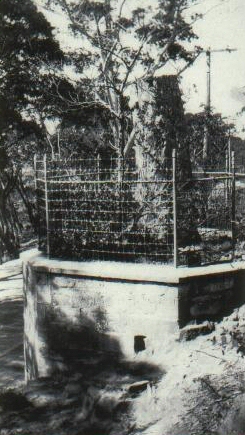
Tree stump -original tree - symbol explorers
open Aus - photo - tree stump foot Blue Mtns NSW
It is realised that certain
changes have happened in connection with science & technology, trade &
commerce, since this Talk on "Trees" was given in 1958. The Talk,
however, has been contributed to "electricscotland" in its original
form. |

